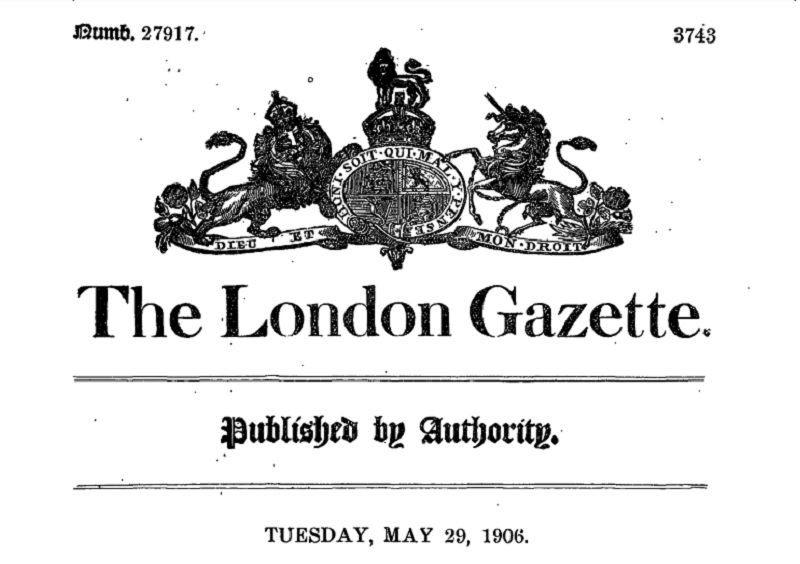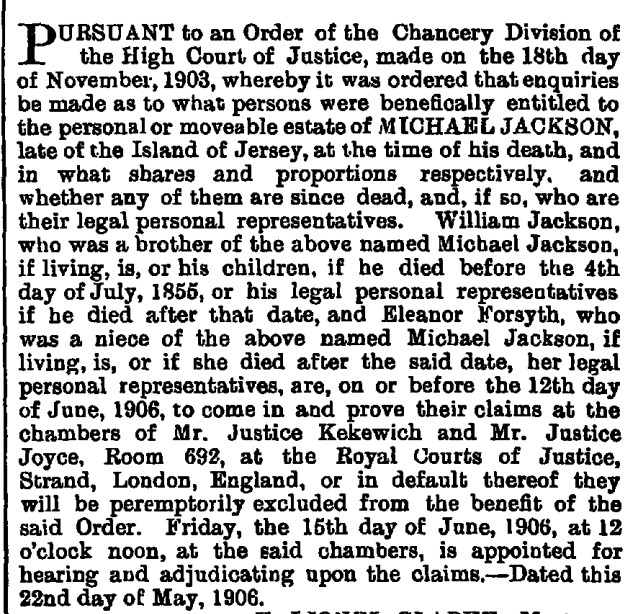Using The Gazette to research the legacies of British slavery
Ashleigh Wilson, a History MA student at University College London, looks at how The Gazette provided insight into Britain’s involvement in the transatlantic slave trade for the Centre for the Study of the Legacies of British Slavery.

The Gazette and the Centre for the Study of the Legacies of British Slavery
The Gazette has long offered free and invaluable research material to all remits of society. Aiding our understanding of what it means to be British, The Gazette’s archival records have enabled us to trace our roots as a nation and, in the process, forced us to question what lessons we must learn from the past.
Recently, academics at University College London (UCL), including Catherine Hall and Matthew Smith, used Gazette records for this exact purpose when undertaking a pioneering research project called the ‘Centre for the Study of the Legacies of British Slavery’, with The Gazette providing invaluable insight into Britain’s involvement in the transatlantic slave trade.
UCL’s research project was established with the sole purpose of exploring the effects of slavery upon the making of modern Britain. Like many historians and academics before them, UCL used the archival records of The Gazette to chart and study the impact of Britain’s imperial conquests. Using these records to provide information into the history of merchants and slave owners across the Caribbean, editions of The Gazette have been paramount in making evident the intertwined nature between slavery and the financial distributions we recognise today.
Acknowledging the legacies that slavery has had upon the present (commercial, cultural, political and imperial), The Gazette continues to be a part of the journey of remembrance and recognition.
Slave compensation records in The Gazette
With commercial legacies in particular, The Gazette has been a real asset. Studying the evolution of merchants and financial institutions who received slave compensation, The Gazette has been used as a historical resource for understanding the impact of slavery upon Britain’s economy.
Academics have used The Gazette to trace the overt legacies of the slave trade upon the financial centres and infrastructures existing in the present, providing evidence and aiding our understanding as to how slave-derived finances were redistributed within Britain. With records locating the specific details of individuals involved with the slave trade throughout the transatlantic slave era, academics behind the Legacies of British Slavery database reference The Gazette to evidence their findings.

George Forsyth
For example, the financial records of George Forsyth have been supported by Gazette issue 27917, published on 29 May 1906, to make evident the involvement Forsyth had when capitalising upon enslaved labour. A mortgage holder, trustee and executor for a multitude of plantations across the Caribbean, the Annandale Estate and St Lucia plantations alone accounted for just under 350 enslaved peoples in Forsyth’s possession.
Profiting from an unpaid labour force, Forsyth’s involvement with the transatlantic slave trade afforded him with an incredible amount of slave derived wealth. In fact, from his associated claims alone, the Legacies of British Slavery database accounts for Forsyth receiving over £20,000 for the ‘losses’ of his enslaved labour force. Investing £5,000 pounds of this into the Perth and Inverness railway, Forsyth was able to redistribute his financial gains into British infrastructure that we continue to use today.
Recognised by The Gazette issue from 1906, the appeal for the persons entitled to his estate after his passing highlights the basis of familial wealth that the slave trade afforded him. The legacies of slave-derived wealth therefore did not end with Forsyth, but rather continued down for many generations to be reinvested into the British economy.
Richard Addison
Records such as Forsyth’s highlight the intertwined nature of slavery with the financial entities of the present. But Forsyth was as only one example that used enslaved labour to fund the growth of Britain’s domestic economy. One of his trustees, Richard Addison, was awarded compensation for both the Coopers Hill and Bath plantation in Jamaica when made to manumit the enslaved people serving on his land.
Identified as a London solicitor in Gazette issue 20024, published on 5 October 1841, Addison received over £5,000 in compensation for his loss of slave labour. The financial rewards from the transatlantic slave trade thereby afforded British citizens with considerable amounts of slave-derived wealth to be used to fund, invest, and support the British economy.
Summary
The Gazette has helped to provide information on merchants and trustees of slave estates across the Caribbean, making evident how people in positions of power were able to use the transatlantic slave trade to capitalise upon and further their own financial gain. The Gazette has provided an invaluable insight into how the exploitation of enslaved peoples helped to fund British industrialisation, forcing historians and academics to come to terms with the intangible presence of slavery upon the present day.
The use of The Gazette by UCL academics has thereby created a space where Gazette editions can be used for their truest purpose – to provide value to society. Whether for something as nuanced and specific as UCL’s research, or to simply contextualise previous commercial decisions, The Gazette’s archives continue to add weight to our understanding of the past. By furthering our awareness of British history, we can only hope that this is used to pave a pathway for an equal, self-aware future.
About the author
Ashleigh Wilson is a History MA student at the University College London. She has a particular interest in post-colonial British history, exploring the transnational, imperial and comparative dimensions of British society.
See also
This month in history: Samuel Sharpe and the Christmas Rebellion
A guide to searching The Gazette
Find out more
Centre for the Study of the Legacies of British Slavery (UCL)
Image: Getty Images
Publication date: 13 April 2022
Any opinion expressed in this article is that of the author and the author alone, and does not necessarily represent that of The Gazette.
